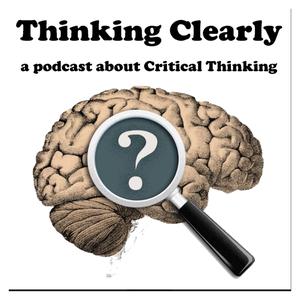
Thinking Clearly
Bob Froehlich-Retired Chemist, Counselor, Psychology Professor and Julia Minton-Technology Consultant
- 59 minutes 12 seconds#102-Worldviews and How they Guide our Beliefs-with guest Annick de Witt
This episode takes a deep dive into the concept of “worldview”, based on the research and work done by Annick de Witt: researcher, writer, teacher, and founder of the organization Worldview Journeys. Topics discussed include: conceptualizing the idea of worldview; how our worldview might affect our beliefs and behaviors; examples of types of worldviews; methods of uncovering our own worldview and the worldviews of others we communicate with; how an awareness of worldviews can help us examine our own beliefs while also improving our dialogues with others.
28 January 2025, 5:25 pm - 59 minutes 6 seconds#101-The Virtues of Evidence-Based Policy Making-with guest Robert MacCoun
Even though they affect all of our lives, most of us know almost nothing about how policies are made, especially policy made by our state and federal governments. So, Julia and Bob learned a lot from this conversation with guest: Robert MacCoun, Law Professor at Stanford University. With a Bachelor’s, Master’s and PhD degree in Psychology, professor MacCoun has long worked at the nexus between law and psychology and specialized in bringing evidence-based policy making into policy decisions, including controversial areas such as military policy debates about allowing gays and lesbians to serve openly in the US military and drug policy. His book, "Drug War Heresies" is considered a landmark scholarly analysis of the drug legalization debate.
25 December 2024, 5:17 pm - 59 minutes 3 seconds#100-Foundations and Future of Critical Thinking-with guest Kevin deLaplante
This discussion with philosopher, former tenured professor at Iowa State University, and now independent critical thinking educator and consultant, Kevin deLaplante, revisits the importance and benefits of critical thinking in today’s post-truth world, reviews the basic skills involved with critical thinking and understanding of human cognitive vulnerabilities, while also introducing more recent ideas about human cognition like the Predictive Processing Model and Extended Mind Theory. The resources for learning and practicing critical thinking, found at Kevin’s Argument Ninja Dojo membership program, are also discussed.
26 November 2024, 5:05 pm - 59 minutes 7 seconds#99-How internet influencers, algorithms and crowds are altering our politics, our society and our very relationship to reality-with guest Renée DiResta.mp3
Researcher, author and former Research Manager of the Stanford Internet Observatory, Renée DiResta, discusses how numerous internet-savvy individuals (influencers) are causing a profound shift in power and influence over our politics, beliefs and behavior, as outlined in her recent book: Invisible Rulers: The People Who Turn Lies into Reality. She also discusses: what can be done to mitigate the negative effects of this influence while harnessing the power of the internet to bring us together to thrive as we reestablish the trust and cooperation needed to meet our future global challenges.
21 October 2024, 11:15 pm - 59 minutes 13 seconds#98-The Nature of Curiosity and it’s implications for Critical Thinking-with guest Jacqueline Gottlieb
Professor Jacqueline Gottlieb, Principal Investigator at Columbia University’s Zuckerman Institute and former head of the Research Cluster on Curiosity at Columbia University’s Center for Science and Society, brings her research experience and deep thinking about the human brain's higher cognitive functions—including decision making, memory, and attention—to discuss that wonderful and invaluable human capability that we call curiosity.
24 September 2024, 4:06 pm - 59 minutes 15 seconds#97-How to Navigate the Challenges of Living in a Divided Nation-with guest Tania Israel
Second time Thinking Clearly guest, Tania Israel, Professor of Counseling Psychology at UC Santa Barbara, guides us through how to overcome the toxic effects of consuming politicized news and social media in this current, highly polarized American environment and discusses how to more effectively communicate with people holding opposing views to ours. Professor Israel is the author of the recently published book: Facing the Fracture: How to Navigate the Challenges of Living in a Divided Nation.
27 August 2024, 4:18 pm - 58 minutes 54 seconds#96-Using practices and tools from science while also learning how to weave together facts and values to rebuild trust and cooperation-with guest Robert MacCoun
Calling on his experience in evidence-based policy making, teaching a course at UC Berkeley called Sense and Sensibility and Science, and coauthoring the book Third Millennium Thinking-Creating Sense in a World of Nonsense, social scientist and law Professor at Stanford University, Robert MacCoun, discusses: how to avoid failure modes when making decisions; using practices, and tools of science to make better decisions in our every-day-lives; the value of probabilistic thinking; how to weave facts and values together; and how to reboot trust and develop a new collaborative approach to our shared problems and opportunities.
23 July 2024, 4:51 pm - 59 minutes 20 seconds#95-Critical Thinking and the Nature of Human Consciousness-with guest Anil Seth
Research and current theories about the nature of human consciousness are explored with guest Anil Seth, Professor of Cognitive and Computational Neuroscience at the University of Sussex. Topics include: how human consciousness can be thought of as controlled hallucination, the relationship of human consciousness to critical thinking, how thinking of the brain as a "prediction machine" affects how we form beliefs, and a number of other topics from Professor Seth’s international best selling book: Being You-a New Science of Consciousness. Dr. Seth has co-authored close to 200 journal publications, and is a regular contributor to the New Scientist, The Guardian, and BBC.
25 June 2024, 4:27 pm - 56 minutes 57 seconds#94-The Essence of Critical Thinking and Demonstrations of How to Have Civil Dialogues
Thinking Clearly hosts Bob and Julia review their definition of critical thinking, discuss how doing a show about critical thinking has changed them, and do several demonstrations of best practices (using the LAP-EFI method) for having productive, civil dialogues with people who have different views than yours.
28 May 2024, 3:28 pm - 59 minutes 18 seconds#93-Critical Thinking Fundamentals and how to find truth in all the noise-with guest Dr. Seema Yasmin
Dr. Seema Yasmin, professor at Stanford University School of Medicine and the Anderson School of Management at UCLA, discusses: information disorder and its treatment, common techniques used for pushing lies, the use of narrative in communicating, the history and current state of journalism in America, how to best consume the news and mitigate the negative effects of social media, and a wide variety of other topics. Dr. Yasmin has investigated disease outbreaks for the CDC, worked as a CNN medical analyst and authored many books including: What the Fact? - Finding Truth in all the Noise.
23 April 2024, 3:11 pm - 59 minutes 1 second#92-Election 2024 Preparation 4-Teaching Critical Thinking to American Military Future Leaders-with Guest Stephen Gerras
In this fourth in a series of Thinking Clearly episodes—offered in the hope of fostering critical thinking and civil dialogue as we approach our 2024 Presidential Election in America—we are replaying core episodes with those themes. In this edition, you’ll hear a previous episode that we recorded with Colonel (retired) Steve Gerras, who teaches critical thinking at the Army War College, sharing his advocacy and passion for critical thinking, and his experiences of teaching it to future military leaders. Professor Gerras has a PhD in Industrial and Organizational Psychology from Pennsylvania State University and has authored and coauthored many publications including the widely circulated: “Lying to Ourselves: Dishonesty in the Army Profession.”
26 March 2024, 4:28 pm - More Episodes? Get the App
Your feedback is valuable to us. Should you encounter any bugs, glitches, lack of functionality or other problems, please email us on [email protected] or join Moon.FM Telegram Group where you can talk directly to the dev team who are happy to answer any queries.
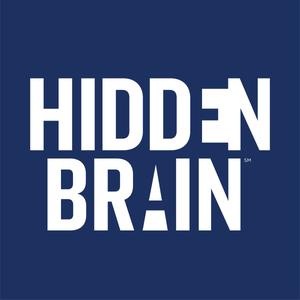 Hidden Brain
Hidden Brain
 Something You Should Know
Something You Should Know
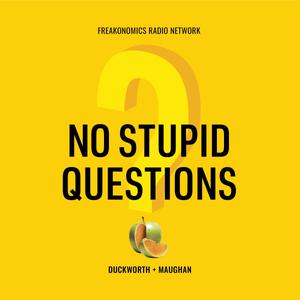 No Stupid Questions
No Stupid Questions
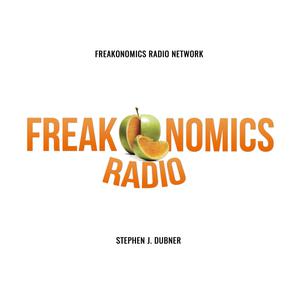 Freakonomics Radio
Freakonomics Radio
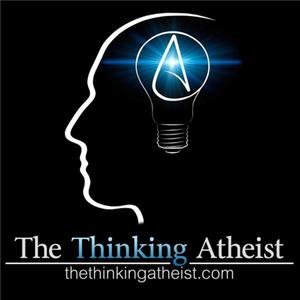 TheThinkingAtheist
TheThinkingAtheist
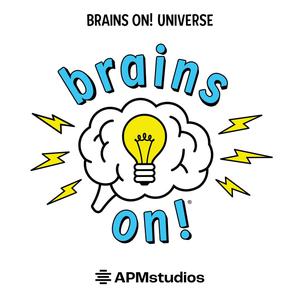 Brains On! Science podcast for kids
Brains On! Science podcast for kids